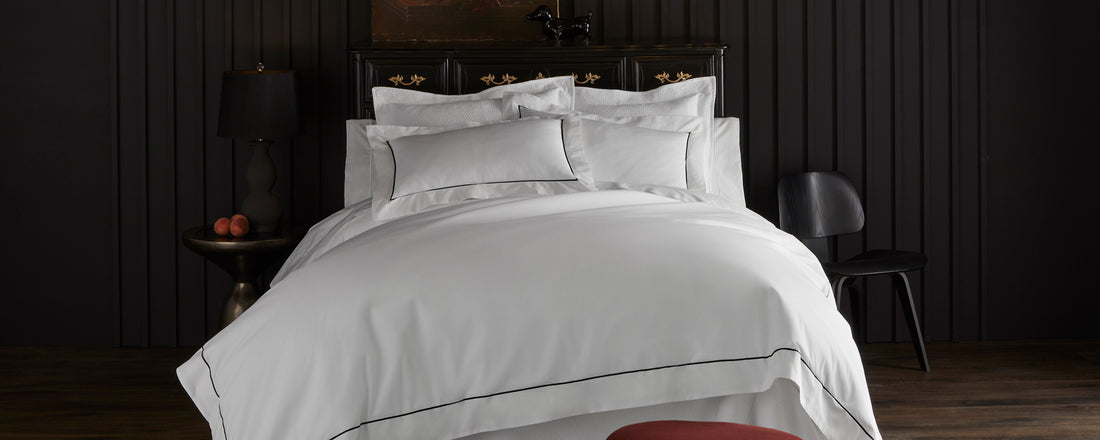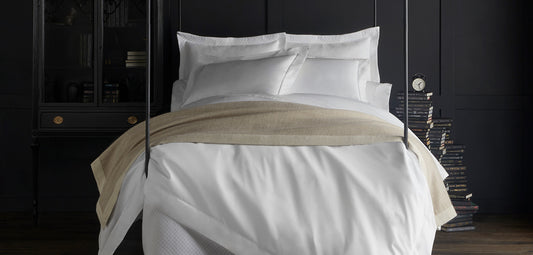Want to improve sleep quality? Invest in better bedding! One in three American adults reports not getting enough sleep at night. If you fall into this category, a good mattress, luxury linens, and supportive pillows can help you sleep better.
Read on to discover how to improve sleep quality via luxury bedding and a few simple changes can create a supportive sleep environment and improve the quality of your sleep.
The Role of a Mattress in Sleep Quality
As the base of your bedding, a mattress can make or break your sleep experience. Everyone has individual preferences. Still, there are a few characteristics to consider when choosing a quality mattress.
First, your mattress should offer adequate support to maintain your spine's natural alignment. It should evenly distribute your body weight and take pressure off your joints. For couples, a mattress with motion isolation can absorb movement from your sleep partner. This stability can stop disruptions at night. Some mattresses offer gel-infused memory foam and temperature-regulation properties. Others feature hypoallergenic materials for allergy sufferers.
Impact of Blankets and Sheets on Sleep
The right blankets, sheets, pillowcases, and other bedding can also improve sleep quality.
Breathable sheets made from organic cotton and linen promote air circulation, helping regulate body temperature for comfortable sleep. Luxury sheets with a premium weave and high thread count also offer superior softness.

Soprano Sateen Sheet Set

European Washed Linen Sheet Set

Clara Sateen Sheet Set

Nile Egyptian Cotton Sheet Set
Duvets and comforters come in varying warmth levels based on your preferences, the season, and the climate. For instance, down duvets and synthetic alternatives let you pick your level of insulation. At the same time, wool options offer incredible temperature regulation and moisture-wicking properties. Blankets made from airy materials like cotton and linen help prevent overheating. In contrast, weighted blankets provide extra warmth and security for better sleep quality.

White Goose Down Duvet

Down Alternative Duvet

Silk Filled Duvet Insert
Proper pillows are also crucial as they support the head and neck. A quality pillow will maintain your spine's natural curvature to protect the neck and shoulders. Like mattresses and other bedding, pillows come in hypoallergenic options with cooling features. Some even cater to specific sleeping positions. For instance, side sleepers may opt for a thicker pillow to support the area between their neck and shoulder.


White Goose Down Pillow

Down Alternative Pillows
Sleep Environment Optimization
Creating an ideal sleep environment helps minimize disruptions and improve sleep quality. If you live in a busy area with a lot of outside noise, use a white noise machine or earplugs to block the sound. Similarly, hanging blackout curtains can prevent outside light from entering your bedroom. Some even have soundproofing features to reduce noise.
According to the Environmental Protection Agency, your humidity levels also matter. They should ideally be between 30% and 50%. Sleep experts also recommend maintaining a bedroom temperature between 60 and 67 degrees Fahrenheit.

Establishing a Consistent Sleep Schedule
Setting a consistent sleep-wake schedule improves sleep quality by supporting your circadian rhythm. This natural cycle sets your body's internal clock, signaling when to go to bed and when to get up.
When establishing a sleep schedule, start slowly. Gradually adjust your bedtime by an hour or two until you reach your ideal time. Keep your wake times the same, even on the weekends, limiting the difference to an hour.
Pre-Bedtime Routine for Better Sleep
Establishing healthy sleep habits is also essential for better sleep. Building rituals and doing the same thing every night can signal to your brain that it's time to wind down for bed. About an hour before sleep, take some time to unwind. Calming activities include stretching, gentle yoga, meditation, soothing music, or reading.
What you do during the day also matters. Exercise can release endorphins and reduce stress during waking hours. This daily movement sets you up for deeper and more restorative sleep at night. You should limit strenuous activity to earlier in the day, ideally at least a few hours before bed.
Eating a nutritious diet can also impact your sleep. Processed foods and fats can cause inflammation, keeping you up at night. If possible, drink your coffee and other caffeine earlier in the day. Avoid eating at least three hours before bed to give your stomach enough time to digest your food.
Managing Light Exposure
Exposure to light in the evening can reduce melatonin production. This is your body's hormone that facilitates sleep and impacts your circadian rhythm. Research also shows that blue light from electronics can disrupt your circadian rhythm. To combat this, avoid bright, artificial lights and turn off your screens — TV, computer, phone, etc — an hour before bed.
Improve Sleep Quality with Peacock Alley’s Luxury Bedding
Investing in a high-quality mattress and luxury bedding can optimize your sleep environment. Implementing healthy habits and practicing good sleep hygiene also helps improve sleep quality.
The best luxury bedding provides breathability, comfort, and temperature-regulating properties. From crisp cotton sheets to luxury duvets filled with the finest European goose down, Peacock Alley has all the premium bedding you need. Peruse our exquisite collections for ideas to elevate your space. Or, mix and match our luxe designs to personalize your bedroom and improve your sleep quality.


























